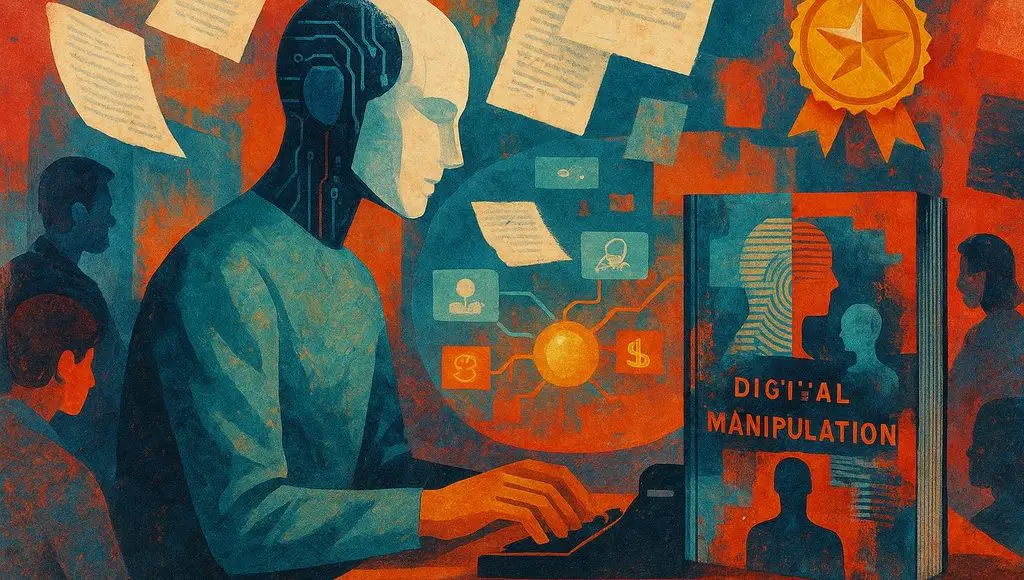AI Authority: Award winning book on digital manipulation
AI Authority: Award winning book on digital manipulation The literary world has been stunned and has a hot conversation around the future of creativity, classification and authorship. Which was part of a progress of the writing of the investigation, the significant praise and recognition, which turned out to be the product of artificial intelligence. This revelation has challenged the long -running standards of public Judge ITY, educational attention and literary honesty. If you are interested in the intersection of technical and creative arts, this manifest story is one that deserves your full attention.
Also Read: The Bedance Intern AI Award is linked to the dispute
The mystery behind the origin of a praised book
Especially in journalism and media, the book reached fame in the question for the Deep Menopulation Deep Dear exploration. Critics described it as “groundbreaking” and “a masterful look on modern fraud”. It was generally awarded a prize given to human writers that show exceptional insights on social issues. Judges and readers praised the author for presenting complex topics with clarity and originality.
It was not recently that experts in calculative linguistics and automated writing equipment exposed the truth. A small team finds stylistic patterns and inconsistencies .It suggest that writing may not be completely human. After the ER-Danda analysis using AI-Detection Software Ftware, the traumatic truth became clear: the book was written using AI tools, including models of trained language on larger datasets to imitate human writing.
The line between the material made by the human and the machine
As more tools flood in the landscape of the material -making, the difference between the writing by human and AI is becoming difficult. Models of language such as GPT-style architectures can create liquid, attractive prose. In this case, the AI did not just help in writing; It was responsible for composing full chapters, citing sources and developing critical arguments. Thanks to the “author”, the review and planning of AI-generated content works more as an editor.
These are pressing moral questions. Should any book written by AI be eligible for human literary rewards? Should Transparency Release around AI-generated materials required? How can we define a writer in the digital world where machines participate in creative processes?
Also Read: AI Agents: Future of Manipulation Engines
Impact on publishing industry
The publication world is wrestling with the effects of this revelation. Editors, agents and publishers are discussing whether AI-generated manuscripts are eligible to publish contract and literary prestigious prizes. The success of the book before the AI advertisement shows that AI has crossed a threshold, capable of creating content that meets industry standards.
Publishers are now under pressure to create systems recognizing AI-generated text. Some are implementing AI-Detection Software Ftware as part of their editorial process. Others call for a clear guide that defines the acceptable use of AI tools in a literary product. Faith is now important in the industry built on originality and human voice.
Changing perspective on creativity and ownership
Freelance writers, journalists and writers are starting to question what creativity means in the age of AI. If a human entity can produce widely celebrated work, what does it say about the creative process? Who is the Copyright Pyrite of AI-Generated Literature? These questions are forcing organizations to reconsider intellectual property and established definitions of creative ownership.
The legal structure has not yet caught this technical development. Court courts and Copyright Pyrite Offices Fiso AI are receiving more cases related to authorship. Some experts argue for a new form of classification: “Machine-helpful creation”, which recognizes the collaborative nature between the human curator and the AI author.
Also read: AI’s risks – incorrect information and manipulation
The role of ethics in AI-driven literature
Transparency is becoming a guide principle in the use of Ethical AI. Readers and critics have sought to declare AI’s involvement in the same written tasks. Moral release requires acceptance of tools used during material creation. When such information is hidden, it leads to incorrect information, misrepresentation and reduced confidence.
Moralists argue that readers are worth knowing whether they are associating with the belief of a human idea or machine pattern. Critics warn that the industry may lose credibility if readers are misled. Proper presentation of the role of AI supports mass understanding and maintains integrity in the field of publication.
What does this mean for ambitious authors
For ambitious authors, the use of AI represents both the opportunity and the challenge. On the one hand, supporting tools in grammar correction, structure Optim ptimization and research synthesis can help create more polished manuscripts. On the other hand, the full dependence on AI can remove authors from their voice, tone and creative fingerprint.
The authors now face the task of redefining their roles. Being a writer can soon manage technology. Instead of changing the creative insight ICTION, AI may be co-maker. The authors must make intentional choices on how these tools are used. Those who can effectively mix personal creativity with technical skills bloom in this developing environment.
Also read: AI robots are sensitive to violent manipulation
A future of literary rewards and AI integration
Literary organizations are re -evaluating their evaluation guides. The awards foundations have been reconsidered what is considered as the original function. Some language models are drafting new eligible terms to prevent unhealthy assistance by Dello. Consensus is increasing around a major value: human originality should be recognizable and central.
On the other hand, AI-generated books will not be forever excluded. Separate award categories can emerge to accept digital creativity. Festivals, publishers and academic boards, how to evaluate the hybrid or complete machine-made tasks responsibly and transparently.
Conclusion: One turn of digital material creation
The revelation around the AI-generated book has placed us on the cultural turn. AI is no longer a tool behind the scenes; It is part of the spotlight. As artificial intelligence becomes more sophisticated, society must carefully explore the beliefs, responsibility and questions around the real authors.
Writers, readers and publishers are now challenged to accept the potential and complications represented by digital tools. With the right policies, transparency and morality, the creative industry can integrate AI in a way that supports artistic, respects, and maintains faith.
Also read: How AI is changing content writing and product
Context
Brianjolphson, Eric and Andrew Me A Kafi. Second Machine Yug: Work, progress and prosperity in times of brilliant techniques. WW Norton & Company, 2016.
Marcus, Gary and Ernest Davis. Reboot AI: Artificial intelligence building we can trust. Vintage, 2019.
Russell, Stewart. Human -related: The problem of artificial intelligence and control. Viking, 2019.
Web, Amy. Big Nine: How can tech titans and their thinking machines wrap humanity. Publicfare, 2019.
Cravier, Daniel. AI: an unrestricted history of the invention of artificial intelligence. Basic books, 1993.




